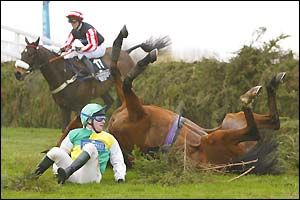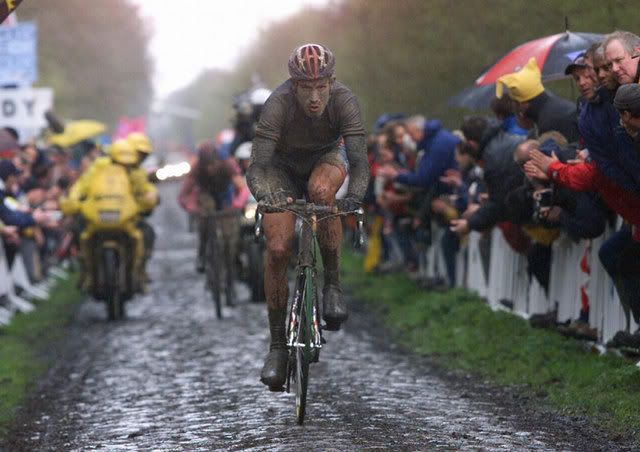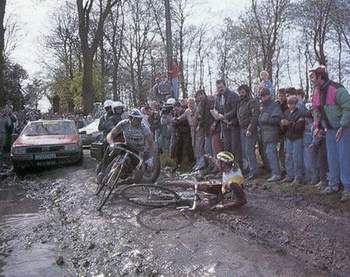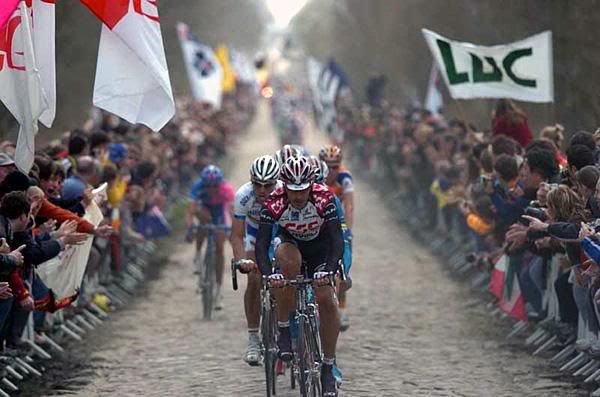Sports of Attrition
This weekend saw two sporting events--nay, spectacles--in which the number of entrants and the number of finishers is a small fraction of the number of starters.
First, my neighbors informed me Saturday morning that one's English experience isn't complete unless one bets on the Grand National hunt race. Lest you think this is an ordinary horse race, think again. In fact, think National Velvet. This event makes anything in the Triple Crown look like a Saturday trot--four and a half miles, thirty fences to jump, some with ditches that must also be hurdled. In fact, the Kentucky Derby is boring by comparison.
This is a typical photo from the Grand National:

(This was from two years ago)
Forty horses entered, and nine finished. In fact, something like 10 percent of the field fell at the first fence, giving you an idea of just how hard it is. I did watch it. It's kind of like watching a car crash--you just can't take your eyes off of it. I didn't, however, get up to the local bookie in time to make a bet.
(It's also a very cruel event that should be ended, along with horse racing in general. Mrs. Werbenmanjensen couldn't watch, it looked so dangerous. The Grand National routinely results in horses being killed after they suffer injuries on the dangerous course, although only one was killed this year.)
Sunday was the Paris Roubaix cycling race, known variously as "The Hell of the North," "the Queen of the Classics," and simply as "La Pascale" because it tends to take place around Easter (and is part of the adage "Jamais un cloche ne gagne la Pascale" -- the Easter race is never won by a tramp). The race is won on the rough cobbled roads of northern France--close to 33 miles of the 160 mile race run on cobbles, 27 separate cobbled sections in all. In wet years, this is a typical image from late in the race ...

... as is this.

This year was dry, so the images looked much more like this ...

... although the dry cobbles didn't keep 82 of the 194 starters from dropping out.
It's said that Paris-Roubaix doesn't really start until the first stretch of cobbles. The mad rush to be at the front before the road narrows almost inevitably causes a crash, and everybody caught behind is almost surely out of the race.
First, my neighbors informed me Saturday morning that one's English experience isn't complete unless one bets on the Grand National hunt race. Lest you think this is an ordinary horse race, think again. In fact, think National Velvet. This event makes anything in the Triple Crown look like a Saturday trot--four and a half miles, thirty fences to jump, some with ditches that must also be hurdled. In fact, the Kentucky Derby is boring by comparison.
This is a typical photo from the Grand National:

(This was from two years ago)
Forty horses entered, and nine finished. In fact, something like 10 percent of the field fell at the first fence, giving you an idea of just how hard it is. I did watch it. It's kind of like watching a car crash--you just can't take your eyes off of it. I didn't, however, get up to the local bookie in time to make a bet.
(It's also a very cruel event that should be ended, along with horse racing in general. Mrs. Werbenmanjensen couldn't watch, it looked so dangerous. The Grand National routinely results in horses being killed after they suffer injuries on the dangerous course, although only one was killed this year.)
Sunday was the Paris Roubaix cycling race, known variously as "The Hell of the North," "the Queen of the Classics," and simply as "La Pascale" because it tends to take place around Easter (and is part of the adage "Jamais un cloche ne gagne la Pascale" -- the Easter race is never won by a tramp). The race is won on the rough cobbled roads of northern France--close to 33 miles of the 160 mile race run on cobbles, 27 separate cobbled sections in all. In wet years, this is a typical image from late in the race ...

... as is this.

This year was dry, so the images looked much more like this ...

... although the dry cobbles didn't keep 82 of the 194 starters from dropping out.
It's said that Paris-Roubaix doesn't really start until the first stretch of cobbles. The mad rush to be at the front before the road narrows almost inevitably causes a crash, and everybody caught behind is almost surely out of the race.




8 Comments:
Oh, the glories of the pavé...
Woohoo!!!! Fabian Cancellara won the Paris-Roubaix. Looks like Hincapie didn't even start? At least, he didn't finish.
Georgie had his steerer tube snap with about 90K to go and he took a header. He broke his collarbone and will undergo surgery. He looked distraught. He made the selection in Arenberg and, well, who knows what would have happened? And then all of a sudden you see his arms fly up and he's just tumbling over.
When Cancellara moved, you just suddenly knew the race was over. He just dropped everybody with such ease ...
By the way, I think Tom Boonen's a pretty good guy, but I just can't stand to see races like Paris-Roubaix won by sprinters. (This was the same reason why I was happy to see Fillippo Pozatto win Milan-San Remo, rather than Petacchi.) The race is too hard to be won by the guy who has the fastest final 250-meter kick. I'd rather it be won by a guy like Cancellara, who makes a smart, strong move and goes away for the win.
But there are wins and there are wins. A sprinter who wins out of an attacking bunch is a different beast to one who comes out of a peloton. True, you want P-R won by someone who is, above all, brave to the point of insanity, but you can't overlook the capacity to respond to attacks and have enough left in the tank.
All I can say is that I really loved it when Cancellara won the prologue in the 2004 Tour de France. I've liked him ever since and I hope he'll have a Tour win in the future.
I agree with MK. Cancellara is a rider for the future. Probably not a grand tour winner, because he's probably not as good a climber as you need to be to win (at least, not yet). But he's got the breakaway power to win a lot of one-day races in his career.
Pseudonymous also raises a good point, and Boonen's win would have been well-deserved. He is a rider who can join a breakaway bunch in a great classic.
Petacchi, on the other hand, seems to be a field sprint winner. Which, again, is why I was so happy to see Pozatto win at Milan-San Remo. That finish was wild.
Post a Comment
<< Home